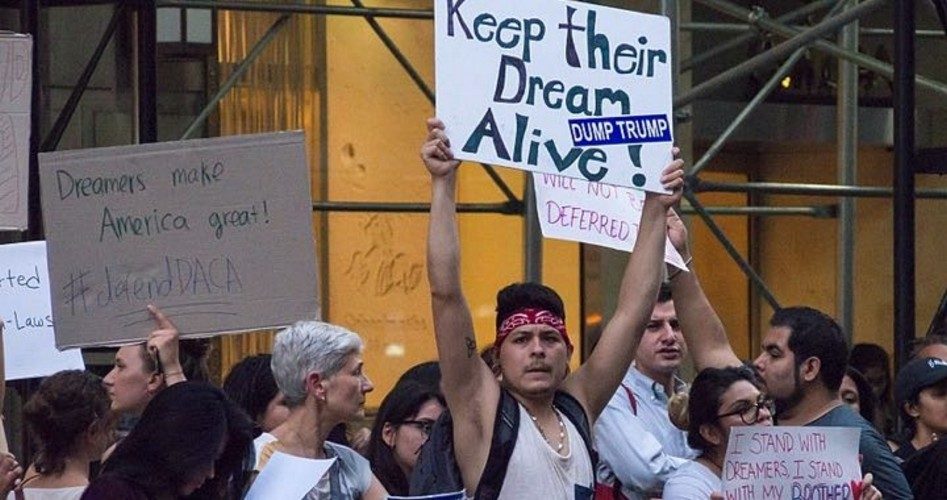
President Trump expressed a pessimistic outlook about the prospects for reaching a bipartisan agreement that would protect young aliens who came to this country illegally from deportation — and also prevent a government shutdown on January 19 — in a message he sent on Twitter on January 14: “DACA is probably dead because the Democrats don’t really want it, they just want to talk and take desperately needed money away from our Military.”
The Washington Post noted that Democrats have linked DACA to spending negotiations being held ahead of the January 19 government shutdown deadline. Republicans are seeking an increase in military spending, while Democrats want a DACA deal and a matching increase in non-defense funding.
The Deferred Action for Childhood Arrival (DACA) program, which began in 2012 as executive actions implemented under the Obama administration, nears its expiration in March. The program extends protections from deportation for an estimated 700,000 young aliens who entered the United States as children with their parents and came here illegally.
Trump called for an end to the program last September, but allowed for a six-month delay to allow Congress to arrive at a solution to settling the fate of the young aliens that is acceptable to both parties.
In addition to the future of DACA, the approval of a budget to keep the federal government running is also at stake. Representative John Lewis (D-Ga.) speaking on ABC News’ This Week on January 14, expressed the view of many Democrats when he said that he would not vote for any government funding measure until the DACA issue is settled.
A January 14 report in the Post observed that congressional negotiators spent last week seeking to arrive at a compromise on DACA, but a tentative deal worked out by a small bipartisan group of senators disintegrated during a January 11 Oval Office meeting in which Trump became frustrated with a proposed immigration plan that would facilitate the admission of immigrants from Haiti, El Salvador, and African countries and reportedly responded by using coarse language. The Post broke an anonymously-sourced story that alleged that Trump asked the senators why they would want people from Haiti, Africa, and other “s***hole countries” coming into the United States.
Trump denied using the language and statements made by those in attendance tended to differ according to partisan lines, with Dick Durbin (D-Ill.) insisting that Trump had used that word while Tom Cotton (R-Ark.) and David Perdue (R-Ga.), who also attended the meeting, denying that Trump had ever said it. Perdue said in a January 14 interview on ABC’s This Week With George Stephanopoulos that Trump did not use the offensive word.
“I’m telling you he did not use that word, George,” Perdue said, accusing Durbin of making a “gross misrepresentation” of what took place in the meeting: “It’s not the first time Senator Durbin has done it, and it is not productive to solving the problem we’re having.”
On the NBC News program Meet the Press, on January 14, host Chuck Todd asked Senator Rand Paul (R-Ky.) about the comments that the president reportedly made during the White House discussions on immigration policy. Without attempting to either confirm or deny the accuracy of the reported statement, Paul said: “I don’t think the comments were constructive at all.” But the senator, who is also an ophthalmologist, also said that “to be fair, we shouldn’t draw conclusions that he didn’t intend.”
Paul continued by relating a story from his personal experience:
I did about 200 cataract surgeries with a group of surgeons in Haiti and the same in Central America. And when we asked Donald J. Trump as a private citizen to support those trips, he was a large financial backer of both medical mission trips. So I think it’s unfair to sort of draw conclusions from a remark that I think wasn’t constructive, is the least we can say.
And I think it’s unfair then to sort of all of a sudden paint him, “Oh well, he’s a racist,” when I know, for a fact, that he cares very deeply about the people in Haiti because he helped finance a trip where we were able to get vision back for 200 people in Haiti.
Todd and Paul moved on to discussing the main point of the January 11 White House meeting, before it was obscured by the tangential discussions over what the president allegedly did or did not say. And that was whether the president would stand by his original campaign commitment to end DACA or whether he and congressional Republicans would compromise with Democrats.
Todd asked Paul where he stood on the various compromises that have been discussed. He noted: “There’s a difference between the compromise bill in the Senate. Lindsey Graham and Dick Durbin were the two people presenting this compromise there. That’s on the left. Additional money for border security, citizenship for dreamers, dreamers’ parents would be protected, but no citizenship. Diversity lottery ended, but those slots reallocated. Can you support something like that? Or do you think that’s too open borders for your taste?”
Paul replied:
I can support a compromise. And in fact, I’ve been offering to the Democrats a compromise for about six months, that they’ve turned their head and sniffed at and said, “Oh no, we don’t have to give up anything, we’re just going to get what we want.” My compromise all along was, those who are here, the kids that came here or their parents brought them here illegally, we could internally immigrate them, but just count them against the normal totals.
So, like, next year a million people will come. And if you had 200,000 dreamer kids, have a million minus 200,000 come next year, and we count the 200,000 as part of the million that would have come anyway. That way your immigration totals aren’t going up, they’re staying the same and you’re internally immigrating people who are already here. I think that’s the compromise.
But the Democrats have sort of sniffed at that and said, “Oh no, we want just, you know, our DREAMER act without anything.” But now I think the president has changed the dynamic. There is going to be, the DREAMERS are going to get naturalized, but there’s going to have to be something for border security and it has to be real and it has to be significant.
The compromise that Paul described is already light years away from the hard-line stand that Trump originally took. If it is an accurate description of what Trump and Republicans in the Senate are willing to accept, conservative supporters of the president’s original position will be greatly disappointed. And, yet, it apparently wasn’t enough of a compromise for Democrats such as Durban.
Which makes one wonder if he and his allies in the liberal media concocted the entire Haiti episode to blow up the negotiations and also derail the budget discussions to improve their bargaining position.
Photo: Rhododendrites
Related articles:
Trump’s Alleged Coarse Remark Aside, Is Immigration From Undeveloped Countries Good for America?
“Bill of Love”: Trump’s Ongoing Effort to Strike Deal With Democrats for DACA Recipients
Trump and Democrats Working on Deal Over Future of DACA Recipients Before Program Expires
DHS Assistant Secretary Says Administration Supports Allowing “Dreamers” to Stay
Trump’s Apparent Willingness to Preserve DACA Disturbs His Conservative Base
15 States and DC File Suit Against Trump Administration Plan to Rescind DACA



